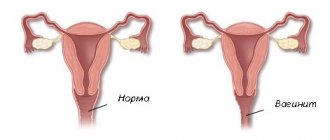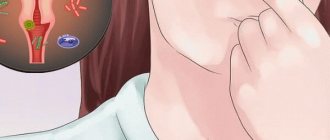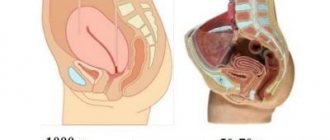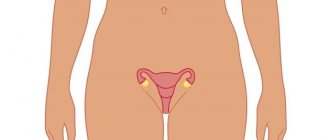There is nothing more delightful and wonderful than the birth of a child. The woman has been waiting for 9 long months. During this period she does not have menstruation. The placenta forms in the uterus, which nourishes and supports the development of the baby.
Childbirth can take place in different ways. Most babies are born naturally. But often there is a need for a caesarean section. Regardless of the course of the process, every woman experiences discharge after childbirth. Not everyone has an unpleasant odor. In most cases, this sign indicates pathology. This article will tell you why there is discharge with an unpleasant odor after childbirth, and how to get rid of it.
Norm
After the baby is born, the final stage of childbirth begins - the passing of the placenta. In its place a large wound surface forms. It is from this area that the bleeding begins. This process is normal and usually does not require medical intervention. An important condition is a small loss of blood, as well as the normal state of health of the woman in labor.
Subsequently, the discharge becomes less abundant. They last from 4 to 8 weeks. At first, the lochia has a rich red tint, later turning brown. By the end of the second month, a woman may detect only minor bloody discharge.
When you can't do without a doctor's help
When lochia after childbirth has a sharp, rotten aroma and is accompanied by a serious deterioration in well-being, medical intervention is indispensable. A girl should be especially careful if she notices several strange symptoms. Very often, deviations from the norm signal that the body has malfunctioned, inflammation or infection has begun.
You need to pay close attention to the following signs:
- lochia ended a whole month ahead of schedule (clots may accumulate in the uterus and an inflammatory process may begin);
- discharge is abundant and lasts a long time (leads to anemia);
- there is aching pain in the lower abdomen, as well as increased body temperature (a sign of the onset of serious complications).
In order to discover the cause of the disease, you should visit a qualified gynecologist. After a personal examination and examination, we can talk about the details of the necessary therapy.
The examination usually consists of:
- blood, urine and vaginal smear tests;
- ultrasound examination of internal organs;
- inspection and conversation.
It is important to choose a doctor who examined you during pregnancy and knows the details of the birth process of the baby. It will be easier for the doctor to understand, taking into account all the subtleties and details of a particular case.
A word from the experts
Doctors say that after childbirth, discharge with an unpleasant odor may be normal. After all, the placenta was in the reproductive organ for a long time, and now it has separated from its wall. Along with bloody discharge, its remains come out. They do not always have a neutral smell. Often women complain about a specific “aroma”.
Doctors advise lying on your stomach more in the first days after giving birth. This improves the flow of blood from the reproductive organ. It is also necessary to monitor the regularity of bowel movements. You need to empty your bowels 1-2 times a day. If you can’t do this on your own, then you need to use medications. If you experience discharge with an unpleasant odor after childbirth, you should see a doctor as soon as possible. Let's consider the main causes of the symptom.
Antibiotics
If you know that a competent doctor prescribed the medicine after childbirth, you had no side effects and the drug worked correctly, then you should not worry about a slight odor for 21-25 days after the last dose.
If every trip in a small way brings, in addition to the stench, pain or burning, then the drugs are clearly not to blame.
You should also be concerned if the urine smells for more than a month. During this time, the remains should have left the body. So if the process drags on and the intensity does not decrease, consult a doctor.
Impaired blood flow
If there is a very small amount of discharge with an unpleasant odor for a month after birth, then the reason for this may be some kind of obstacle. Sometimes it happens that the uterus stops contracting for some reason. This pathology is often encountered by women who do not breastfeed. Also, the cause of blood retention can be congenital and acquired malformations of the reproductive organ, for example, the presence of a septum.
Often, mothers in labor after a cesarean section experience impaired blood flow, because the tissue in the scar area cannot contract fully. Such women are required to take oxytocin-based medications.
Hormones
Like antibiotics, these substances radically change the usual processes that take place inside.
It often happens that hormones also change external secretion. For example, sweating increases and the sweat acquires an incredibly pungent aroma that was not there before childbirth. It is possible that this causes a strong smell in the intimate area of something sour or pungent.
The change may be due to taking hormonal medications and, if they are prescribed by a gynecologist, this is normal.
Poor hygiene
If discharge with an unpleasant odor appears after childbirth, then perhaps the woman does not pay enough attention to her hygiene. A new mother needs to wash herself after every trip to the toilet. Use gentle intimate hygiene products or baby soap. If you have stitches on the perineum, it is very important to use antiseptics. Otherwise, an infection may occur.
Instead of sanitary pads, doctors advise using disposable diapers. They need to be changed as often as possible. Remember that after childbirth it is not enough for a woman to wash her perineum once a day.
Prevention of complications
To avoid serious consequences, you must follow the following recommendations:
- carefully monitor the condition and well-being, as well as the nature of the discharge;
- thoroughly follow all recommendations received upon discharge from the maternity hospital;
- take blood and urine tests on schedule;
- observe the rules of personal hygiene, wash with warm boiled water at least twice a day;
- If there is any change in the condition or nature of the discharge, you should immediately consult a doctor.
Discharge with a sharply unpleasant odor is not a reason to panic. Perhaps the feeling is subjective, and there is no problem. But to maintain your health, you should promptly seek help from a specialist.
During childbirth, a woman experiences tremendous stress, from which it takes at least several days, and sometimes months, to recover.
At this time, her entire nervous system becomes very sensitive and sometimes it seems to her that an unpleasant odor is coming from her after childbirth, and sometimes this can actually happen.
If a woman thinks that after giving birth there is a discharge with an unpleasant odor, she urgently needs to understand the reasons and rule out the development of certain diseases.
Infection
If a woman has yellow discharge with an unpleasant odor after childbirth, this may indicate inflammation. Doctors call this pathology endometritis. The inflammatory process can develop for many reasons: infection during sanitation, poor hygiene, use of tampons, and so on.
In most situations, the inflammatory process has to be treated with antibiotics. These may be drugs based on amoxicillin, metronidazole or other substances. It must be remembered that during the period of therapy it is worth temporarily stopping breastfeeding.
Iron-flavored secretion and pregnancy
During conception, the fertilized egg, being fixed in the walls of the uterus, causes primary resistance to the foreign body. This process is sometimes accompanied by slight bleeding with an unpleasant iron odor.
After childbirth, the natural excretion of lochia may smell like metal. This is a normal natural phenomenon.
It happens that during pregnancy, brown discharge is detected with a clear iron smell or, even worse, putrefactive, accompanied by pain. Discharge with an odor during pregnancy characterizes fetal fading, as well as ectopic pregnancy. In this case, the embryo must be removed to prevent infection and severe pathologies.
Remains of placenta
An unpleasant smell of discharge a month after childbirth may be a sign of the presence of placenta residue in the uterus. However, this pathology manifests itself not only as one symptom. In most cases, the woman begins to feel very bad. She develops weakness, malaise, dizziness, abdominal pain and fever.
There can be only one treatment in this situation - curettage. The procedure is performed under anesthesia. During the manipulation, the doctor cleans out the remaining tissue and sanitizes the uterus. In particularly severe situations, complete removal of the reproductive organ is indicated. Therefore, you should not delay contacting specialists. Don’t let the situation lead to a disastrous outcome, take care of yourself.
Forum Wisdom: Am I Pregnant?
Intrauterine device
Can the lower abdomen hurt in early pregnancy?
Will the test show before the delay?
Stomach hurts like menstruation
How does a miscarriage occur?
When to take a pregnancy test?
Coitus interruptus
Signs of pregnancy before delay
Delay, negative test...
Is it possible to feel the implantation of an embryo?
The discharge will stop completely and will take about a week or so. It happened to me like that
Summarize
If after childbirth you suddenly have discharge that has an unpleasant odor, you should urgently contact a gynecologist. Many women try to cope with this symptom on their own by douching. However, by doing so you are making it even worse for yourself. After all, during douching, the infection can spread to the fallopian tubes, and subsequently to the ovaries.
Doctors also do not advise taking antibacterial drugs on your own. After all, bacteria are not always the cause of symptoms. Only a specialist can determine why exactly the unpleasant smell of discharge bothers you. All the best to you and a speedy recovery!
Every postpartum woman (whether natural childbirth or cesarean section) experiences vaginal discharge that lasts approximately 6-8 weeks. During this period, the discharge may change color, thickness and smell, as it consists of blood cells, plasma and dying uterine epithelium. However, sometimes the discharge has an unpleasant odor, which may indicate a serious danger to the woman’s health.
What is considered normal discharge?
But especially important changes at this time occur in the uterus, which begin immediately after the placenta is separated from its inner surface (regardless of how the child was born - by cesarean section or through the natural birth canal). The uterus begins to contract, shrink to its normal state. The separation of the placenta is accompanied by a kind of trauma to the inner surface of the uterus, so for 2-3 days it is accompanied by fairly strong bloody discharge, called lochia.
Over time, lochia, which does not have a distinct odor or smells like normal menstrual discharge, changes its intensity, consistency and color, and this should be paid attention to (even if the discharge is not particularly bothersome). On days 6-7 after birth, lochia becomes less abundant and acquires a brown tint, but it can become a little more intense if a woman is breastfeeding or has physical activity. They may also intensify when coughing or laughing, but this is a normal manifestation of more active contraction of the muscles of the abdominal cavity, and with them the uterus.
Discharge is considered normal if it is not accompanied by unpleasant sensations such as irritation, itching, does not have an unpleasant odor, and has completely stopped 45-60 days after birth.
As soon as the discharge has stopped (before or after the specified time), women are recommended to undergo a gynecological examination so that the doctor can assess the condition of the uterus, its cervix, vagina and sutures.
Unpleasant smell of discharge after childbirth: what could cause it?
If an unpleasant odor appears, you should immediately consult a doctor, as this may indicate an inflammatory process or the onset of certain diseases:
- In the first days after birth, lochia is most abundant. They have a characteristic smell of blood and a bright red color. Around the 10th day, the discharge noticeably decreases, its color becomes yellowish or white, but a preli smell may appear, which is not too noticeable if proper hygiene is maintained. Such discharge is considered normal.
- A sour or fishy odor may occur when there is a heavy discharge of white or gray color, which usually indicates a disturbance in the vaginal microflora caused by medications or physical intervention. Most often, this type of discharge may indicate bacterial vaginosis, especially if stitches were placed after childbirth and treatment with antibiotics was carried out. Such a diagnosis can also be obtained if personal hygiene is violated. A sour odor of white cheesy discharge and itching may be symptoms of thrush. This disease occurs against the background of decreased immunity, which leads to a change in the composition of the vaginal flora and the active growth of candida fungus. Unlike vaginosis, candidiasis requires treatment of both sexual partners to avoid relapse (re-infection) of the disease, even if it occurs on its own.
- A pungent smell of rot, and lochia mixed with pus can appear after childbirth, which took place not in the sterile conditions of a delivery room in a hospital, but at home or in emergency conditions (for example, childbirth began in transport - a train, an airplane, etc.) - when there is a high probability of the birth wound becomes infected. Depending on the location of the infection (it can be the vagina, cervix, uterine cavity, peri-uterine abdominal cavity), a number of diseases can occur that have an acute or chronic form:
- endometritis;
- parametritis;
- puerperal colpitis;
- puerperal ulcer;
- postpartum peritonitis.
The acute form of the disease is characterized by the rapid development of the inflammatory process on the affected organ, an increase in temperature, accompanied by severe pain and the accumulation of pus (it can leave along with vaginal discharge and give it a sharp putrid odor).
The chronic form is characterized by nagging pain, a slight increase in body temperature (sometimes it can remain unchanged) for a long time, and cycle disruption.
Postpartum discharge is a kind of indicator of women's health. Therefore, if you begin to notice that the discharge has changed color to a more intense one, has become more abundant, or has acquired an unpleasant odor after childbirth, you need to see a doctor soon so that he can either dispel your doubts or prescribe appropriate treatment to eliminate the cause that led to these changes.
The duration of the postpartum period lasts approximately two months after birth. All this time, the inner walls of the uterus are restored and cleansed, which is accompanied by bleeding. This is a completely natural physiological process, which in itself does not pose any danger to a woman’s health. However, if something interferes with the outflow of lochia (for example, laxity of the uterus - when its smooth muscles are weak and do not contract enough), the discharge acquires an unpleasant odor - this may signal complications in the form of an associated uterine infection or serve as an impetus for inflammatory processes.
Restoring the female body after childbirth
Restoration of the uterus and its return to its original size occurs the sooner the more often the baby is latched to the breast. Feeding on demand stimulates the production of oxytocin in a woman’s body, causing the smooth muscles of the uterus to contract and quickly cleanse it. Therefore, the reproductive system as a whole in a woman who is breastfeeding is restored faster than in a woman who is not breastfeeding.
Another condition for the rapid restoration of a woman’s reproductive system is stable bowel movements; it is necessary to diversify your diet with foods containing fiber to ensure daily bowel movements.
Frequently lying on your stomach causes postpartum discharge to pass unhindered, so roll over onto your stomach more often.
The discharge may change color. If at first they were bright bloody in color, then later their color may change closer to brown. If they don't have an unpleasant odor, don't be nervous about it.
Prevention of diseases of the genital area in the postpartum period will be regular hygiene procedures. Each visit to the toilet should end with washing the perineal area with warm water and soap (preferably baby soap). If the sutures received during childbirth are still healing, after hygienic procedures you should carefully and carefully dry the area, blotting it with a soft cloth.
As long as there is postpartum discharge, you should first use special postpartum and then regular sanitary pads. Tampons should be put off until after your regular period, as they prevent the release of lochia, which can cause an infection. Throughout the postpartum period, a woman should monitor the nature of the discharge, changing pads regularly every two hours.
An unpleasant odor can serve as a signal that an infection has entered the body and an inflammatory disease is developing. This symptom, along with fever, weakness and pain, should be a reason to immediately consult a doctor to determine the cause of poor health and subsequent treatment.
During pregnancy, a woman is under the constant supervision of a doctor, who records the slightest changes in the health of the expectant mother and fetus, prescribes a course of procedures and adequate treatment. After the birth of a child, a woman devotes all her energy and time to the baby, forgetting about her ailments. And yet you should not forget about yourself, since the baby needs a healthy mother, and the spouse needs a wife. Therefore, there is no need to delay visiting a doctor if you notice any abnormalities in your body.
Every woman after childbirth comes into contact with vaginal secretions, which include plasma, dying uterine epithelium, and blood cells. This phenomenon is considered the absolute norm. The secretion can change its color, consistency, and smell. The unpleasant smell of discharge is a sign of the development of pathology. This symptom signals danger, so it should not be ignored.
What should normal postpartum discharge be like?
For the female body, childbirth is a serious test. It is natural to assume that the organs of the reproductive system need restoration. Usually 6–8 weeks are enough for them. The most significant changes occur in the uterus; they begin immediately after the placenta separates from its surface. The uterus begins active contractions in order to return to its normal size. After childbirth, the internal surface of the organ is injured, so for 2-3 days there is heavy bleeding, which gradually decreases and continues up to 8 weeks - lochia.
Heavy bleeding for 2-3 days after childbirth is the absolute norm, and scanty or excessively heavy discharge should be the reason to consult a doctor
Normal discharge does not have a strong odor or smells like blood. Subsequently, the lochia reduces its intensity and changes color to a lighter color. On the 6th–7th day after delivery, the secretion normally acquires a brown tint.
Please note: if a young mother is breastfeeding or practicing active exercise, the secretion may become more abundant. The more actively the abdominal muscles contract, the more abundant the discharge will be.
| Days after childbirth | Color of secretion |
| Two to three days | Bright red, strong, a regular gasket won't suffice |
| Until the end of the first week | Reddish-brown, dark, sometimes black |
| After the first week and up to 5–6 weeks | Brown, yellow-brown, similar to menstrual smear with clotted blood |
| 6–8 weeks | Beige, white-yellow, light, yellowish |
Discharge is normally not accompanied by discomfort in the form of itching, irritation and unpleasant odor; it becomes less pronounced over time and completely disappears on the 45th–60th day after delivery.
Important: after the lochia has stopped, the woman must undergo an examination by a gynecologist.
Causes of discharge with a foul odor after childbirth
An unpleasant odor can develop as a result of stagnation of secretions in the uterus, changes in the vaginal microflora, as well as the progression of inflammation due to infection.
The smell of urine should also alert you. It is often a sign of conditions such as:
- bladder atony (a functional disorder that leads to urinary incontinence);
- vaginal fistulas (holes that form as a result of injury);
- injury to the urethra during childbirth.
In the first 24 hours after the birth of a child, lochia is characterized by increased abundance. They are characterized by a rich red hue and the smell of fresh blood. By the 10th day, the volume of discharge should decrease, and the color of the secretion should change to yellow or white. During this period, the smell of preli often occurs; it is the norm.
A fishy or sour odor may form along with a gray or whitish secretion. Typically, this phenomenon proves the presence of a disorder of the vaginal microflora - bacterial vaginosis. The condition can be triggered by physical or drug intervention. It is especially worth worrying about those women who received stitches after childbirth, as well as young mothers who have undergone a course of antibiotic therapy.
A sour smell along with discharge that looks like cottage cheese is a symptom of the progression of candidiasis (thrush). The disease usually manifests itself as itching.
An unpleasant smell of discharge in 99% of cases is a sign of the development of pathologies
A strong smell of rot can also appear when the birth was not carried out under sterile conditions and an infection has entered the birth wound. The localization of the latter can be very different: the cervix of the organ, the uterine cavity, the vagina, and so on.
If the discharge gives off the smell of onion or garlic, then the reason most often lies in immunodeficiency or metabolic disorders. This smell can provoke inflammation in the uterus, as well as vaginal dysbiosis or thrush.
Secretion with the smell of ammonia tends to occur due to urine leakage at the time of increased pressure in the peritoneum, which can be caused by increased physical activity, sneezing or coughing, laughing, etc. Incontinence can also be provoked by emotional stress and excess weight.
Important: a strong unpleasant odor, subject to hygiene, in 99% of cases is caused by the development of pathologies. Seeing a doctor is mandatory.
If, at the end of labor, the discharge is very scanty and has an unpleasant odor, then perhaps the cause of this condition is a violation of the outflow of blood. Sometimes it happens that the uterus stops contracting with the proper frequency. Mothers who have given up breastfeeding are more likely to experience this pathology. Defects in the formation of the reproductive organ (congenital or acquired) can also be a reason for delayed discharge.
Quite often, mothers who have undergone surgery experience problems with blood flow after childbirth. The tissues in the scar area are not able to contract fully. Such mothers are usually prescribed medications containing oxytocin.
During breastfeeding, the hormone oxytocin is produced, which causes the uterus to contract.
If after childbirth a discharge with a repulsive odor begins to appear, then you should pay closer attention to hygiene. It is advisable to carry out water procedures after each visit to the toilet. For washing, it is better to use regular baby soap or special gentle products. If there are stitches in the perineal area, then it is imperative to use antiseptics, otherwise inflammation due to infection cannot be avoided.
It is advisable to replace sanitary pads with disposable diapers. They need to be changed as often as possible. Washing the perineum once a day is not enough.
If discharge with an unpleasant odor appears, it is necessary to wash the perineum several times a day using special intimate hygiene products.
The repulsive smell of lochia often indicates the progression of the inflammation process against the background of specific infections (trichomoniasis, chlamydia, candidiasis, gardenellosis, gonorrhea and others) and endometritis (inflammatory processes in the inner layer of the uterus). The secretion in this case has a putrid odor:
- yellowish discharge with an odor is the main sign of the development of endometritis. The pathological process will progress very quickly, so it is advisable to immediately seek help from a specialist;
- brown discharge that emits a pungent odor of pus is a sign of the presence of infection in the uterus;
- greenish discharge that smells like pus or fish is also a sign of the development of endometritis. The muscles of the uterus contract weakly, so the secretion does not come out well enough. This circumstance may aggravate the situation.
Lochia may acquire an unpleasant odor 30 days after delivery if there are remains of the placenta in the uterus. This pathology manifests itself in a complex manner, so it is important to pay attention to other symptoms:
- weakness;
- dizziness;
- general malaise;
- fever;
- stomach ache.
In this case, surgery cannot be avoided. In particularly difficult cases, complete elimination of the uterus is performed.
Treatment options
Even a mild disorder in the postpartum period can cause the development of serious pathology. It is very important to maintain hygiene to reduce the risk of complications.
For 3–4 months, it is advisable for a woman to avoid:
- visiting a steam room or bathing procedures;
- bathing in a bathtub or closed reservoir;
- increased physical activity.
- wash yourself more often, including with herbal decoctions (you can use chamomile, nettle or string as a basis). Please note: douching for several months after childbirth is not advisable;
- use a condom during sexual intercourse. Thanks to such forethought, it will be possible not only to avoid the penetration of infection or bacteria, but also to exclude an unplanned pregnancy;
- regularly put the baby to the breast while breastfeeding. The procedure activates uterine contractions and stimulates the process of cleansing the organ;
- empty your bladder regularly;
- practice resting and sleeping lying on your stomach. This position stimulates contraction of the abdominal muscles.
During the first period after childbirth, it is recommended to use condoms as contraception to avoid infection.
If you experience discharge with a repulsive odor, contacting a specialist is mandatory.
In this case, the young mother will need:
- undergo an examination by a specialized doctor and provide answers to all the gynecologist’s questions. It is advisable to contact the specialist who accompanied the pregnancy or is familiar with the history of childbirth and have a card with you;
- take a gynecological smear for flora, as well as a PCR test for infection;
- take urine tests, as well as blood tests and for STDs (sexually transmitted diseases);
- undergo an ultrasound examination (ultrasound).
After determining the exact cause, the doctor prescribes treatment taking into account all factors and the condition of the mother. It is usually medicated. The inflammatory process is most often treated with antibiotics. In most cases, these are drugs based on metronidazole or amoxicillin.
Important: the doctor must select the safest and most gentle medications if a woman prefers breastfeeding. Certain drugs can negatively affect lactation and the health of the baby.
In the case of inflammation after childbirth, therapy may focus on the administration of natural hormones that can be produced by the female body (for example, oxytocin is often administered for endometritis). Candidiasis may require antifungal treatment.
Metronidazole passes into breast milk, so breastfeeding will have to be stopped during treatment
If remains of the placenta were found in a woman’s uterus, then curettage cannot be avoided. The procedure is performed under anesthesia. The doctor cleans out any remaining tissue and then sanitizes the organ. In particularly advanced and complex cases, complete removal of the uterus is possible.
The curettage procedure involves cleaning the uterus from tissue debris and sanitizing the organ.
What awaits a young mother in the hospital?
After contacting the doctor with complaints about the unpleasant smell of postpartum discharge, the woman will need to tell in detail how the birth went, how and when the smell appeared, and undergo a gynecological examination. To make a diagnosis you may also need:
- Pregnancy and childbirth card;
- Microflora smears and PCR;
- Results of blood and urine tests;
- Tests for STDs;
- Ultrasound of the abdominal cavity.
Carrying out all the examinations will take a little time, but do not refuse them, citing being busy with the baby. The appearance of discharge with an unpleasant odor during the postpartum period is a dangerous symptom.
An unusual aroma in itself is not at all a contraindication for breastfeeding. But it is necessary to determine what caused it; the mother may need treatment. For most diseases that can provoke such a symptom, breastfeeding is possible. But, if you need to take antibiotics, breastfeeding will have to be stopped for a while.
If an inflammatory process develops in a woman’s body, the body produces antibodies to it, which also pass into breast milk. This means that with food the baby receives protection from diseases, which may be useful in the future.
A disease such as thrush deserves special attention. Most women are infected with candida fungus, and due to the weakening of the body after childbirth, it can recur.
In advanced cases, vaginal candidiasis can spread to the nipples and provoke oral candidiasis in the baby. This unpleasant disease is treatable, but causes severe discomfort in the child.
If there is a suspicion that the mother has thrush, it is necessary to conduct a diagnosis. Until the diagnosis is confirmed, it is better to feed the baby with expressed milk. It is important to disinfect your nipples before expressing.
You can feed your baby in the same way during the treatment of candidiasis. And in any case, it is important to be attentive to your health and not to cause illness.
Ovulation, conception, pregnancy, childbirth - all these are necessary stages of the process, which in human society is usually called procreation. The final link in this chain is the postpartum period: a woman’s body must recover to a certain level in order to gain the ability to repeat the reproductive cycle - not only the possibility of re-conception or pregnancy, but, sometimes, a woman’s life depends on the quality of the restoration processes. Therefore, it is so important for her to constantly monitor her physical and physiological condition during this period, paying attention to the slightest signs of “failure” in the body. Vaginal discharge that has an unpleasant odor or an unusual color is one of the most important signs of such a pathology.
Possible consequences
Any disease in the postpartum period, accompanied by discharge with an unpleasant odor, can lead to serious consequences. Discomfort and aesthetic inconvenience are only a small part of the problems.
Vaginosis can cause infertility or negatively affect subsequent pregnancy, causing complications during delivery. The disease makes the genitourinary system weak and unable to resist infections.
Endometritis can not only cause infertility, but also cause death. Inflammatory processes can penetrate deep into the body and subsequently affect organs of other systems from the inside. As a result, the development of sepsis (a systemic inflammatory reaction in response to a local infectious process) is possible, which is often incompatible with life.
After childbirth, a woman’s life changes dramatically, and the author of the article was no exception. Lochia is a way of cleansing the body, they are an absolute noma, but only until they begin to emit an unpleasant odor. Initially, I encountered the smell of sweetness in the second week after giving birth. It did not cause severe discomfort, there were no other alarming symptoms, but still I decided to call my gynecologist and report this fact. The doctor advised me to make a decoction of chamomile and wash the perineum with it at least three times a day. I strictly followed the doctor's orders. After a few days the smell stopped bothering me. At week 7, the discharge began to emit a sour smell. At the same time, problems with lactation appeared. I went to the doctor. A smear on the flora confirmed the presence of thrush, the doctor prescribed Pimafucin suppositories. Lochia at that time was no longer abundant. After therapy, the sour smell completely disappeared, and lactation was restored. I learned the following for myself: a timely visit to the doctor is the key to a successful solution to the problem and the opportunity to eliminate negative consequences. Don't be afraid to talk about your symptoms with a specialist. Even a slight deviation from the norm should cause concern and careful attention to your body.
If a foul odor appears in postpartum discharge, it is necessary to identify the cause of the pathology. You won’t be able to do this yourself at home, so you need to seek help from a specialist. A young mother must take care of her own health, because now she is responsible not only for herself, but also for the child.
After childbirth, every woman experiences bloody vaginal discharge - lochia, which becomes lighter over time. This phenomenon is considered normal. Dead epithelial cells and blood cells come out of the uterus. Sometimes discharge after childbirth acquires a persistent unpleasant odor. Can such a condition signal the presence of a pathological process and what to do if a yellow discharge with a distinct rotten odor appears?
Main reasons
Basically, a woman has a strong smell of urine:
- Due to diseases of the genitourinary system.
- Due to kidney disease
- Due to pathology of the gastrointestinal tract.
- Due to the use of a catheter.
- From taking antibiotics.
- Due to changes in hormonal levels.
- Also, urine smells bad if you eat poorly, smoke, drink alcohol or use dietary supplements that do not have international licenses and are not approved by doctors.
There is nothing wrong with the last four, and most often the aroma appears in these cases. Let's look at what to do in these situations.
What should be the normal discharge after childbirth?
Over the course of 1.5–2 months after childbirth, the female body gradually returns to its original state. The uterus begins to contract and decrease in size, and characteristic discharge - lochia - appears.
In the first few days after the birth of the baby, the discharge is quite copious and bloody. Then the intensity of lochia decreases, although a short-term increase is observed when sneezing, coughing or physical activity. As a rule, the discharge does not smell of anything or has a slight smell of blood - this is considered a normal natural phenomenon.
Causes of unpleasant smell of discharge
Typically, postpartum discharge has a slight smell of blood in the first 5-7 days. When the lochia becomes less intense and their color changes to a slightly yellowish color, they may acquire a preli smell, which is very weak with careful personal hygiene. This condition is considered the limit of normal.
The uncharacteristic smell of discharge occurs due to inflammatory or infectious diseases of the reproductive system. The causes of unpleasant odor in an intimate area are described in the table:
| Type of smell | Associated symptoms | Causes |
| Fishy smell | Copious gray discharge and discomfort in the genital area appear | Bacterial vaginosis, poor personal hygiene, antibiotic treatment |
| Sour smell | Itching and burning in the genital area, copious white discharge with admixtures of cheesy formations | Violation of vaginal microflora, growth of Candida fungus (thrush), decreased immunity |
| Putrid smell | Yellow discharge mixed with pus, hyperthermia, ulcers on the genitals (for gonorrhea), greenish secretion with foamy contents (for trichomoniasis) | Infection during childbirth (for example, during emergency childbirth at home), peritonitis, colpitis, endometritis, puerperal ulcer, gonorrhea, trichomoniasis, placenta residues in the uterus |
| Urine smell | Discomfort when urinating, pain in the bladder area, lochia mixed with urine, pain | Vaginal fistulas, tissue damage during childbirth |
Vaginal discharge by color
Almost all unusual leucorrhoea is accompanied by a not very pleasant odor, which, again, can be caused by inflammatory processes. Basically, this is a curdled discharge mixed with pus.
Brown discharge
Discharge of a light, brownish hue is possible if a woman forgets about personal hygiene. As a result, the acidic environment of the vagina changes, and the discharge acquires a characteristic color and unpleasant odor.
This shade of leucorrhoea is characteristic during the onset of menstruation and after it, and also occurs against the background of hormonal changes.
Almost black color in combination with pain in the lower pelvic area is very dangerous, and you need to urgently check for the presence of an ectopic pregnancy. If noticeable drops of blood or pus are added to all this, then perhaps this is caused by one of the types of endometrial inflammation.
Pink discharge
Leucorrhoea of a pale pink color accompanies injury or pathology of the walls of the vagina or uterus, inflammation. Inflammatory processes are usually caused by sexually transmitted infections, after unsafe sexual intercourse, from an infected partner. These include:
- chlamydia;
- gonorrhea;
- mycoplasmosis.
Green discharge
This shade is associated with an increased level of leukocytes in the blood and accompanies inflammation of the genitourinary system.
A “fishy” smell occurs due to vaginal dysbiosis and such an unpleasant disease as gonorrhea. Trichomonas, the bacteria that cause trichomoniasis, may also be responsible for this odor and color. Another reason is cervical erosion.
If after the process of defecation the amount of discharge increases, it is viscous and thick, then perhaps we are talking about cervicitis. Most likely, it began to progress, releasing pus.
In addition to green leucorrhoea, the following may be observed:
- severe nagging pain;
- general fatigue;
- dizziness;
- elevated body temperature.
Yellow discharge
A frequent sign of pathologies and inflammation. Bacterial vaginitis is one of the variants of the formation of yellow leucorrhoea with a rotten odor. Colpitis and salpingitis are frequent friends of yellowish leucorrhoea.
All this can be caused by gynecological diseases caused by viruses or bacteria.
Gonorrhea is characterized by yellowish-green leucorrhoea. Patients experience itching and difficulty urinating. A woman experiences similar symptoms with trichomoniasis. Interspersed with pus can be due to chlamydia. Pain experienced during sexual intercourse may increase every day.
Gray discharge
Curdled white leucorrhoea with a gray tint is a possible symptom of the well-known thrush. Redness, noticeable to the naked eye, burning sensation and an irresistible desire to scratch the affected area of the labia are a clear sign of an advanced disease. At the same time, a sour aroma from the vagina also appears.
Diagnostic measures
If uncharacteristic discharge with an unpleasant odor appears, a woman is advised to visit a gynecologist to find out the cause of this condition. Typically, the patient needs to undergo a number of diagnostic measures:
- examination on a gynecological chair (the doctor assesses the condition of the vagina, cervix and sutures);
- vaginal smear to determine pH, culture and identify pathogenic microflora;
- ultrasound examination of the reproductive organs;
- general analysis of urine and blood;
- biochemical blood test (if necessary).
Diagnostic methods
It is necessary to pay careful attention to such conditions, as they are fraught with consequences and can cause significant harm to a woman’s health. If a young mother suspects some kind of infection, she should consult a doctor for examination and examination. The main methods used to diagnose the condition are:
- general gynecological examination;
- for flora, sowing the contents;
- PCR and culture for major pathogenic microorganisms;
- ultrasound examination of the uterine cavity;
- General and biochemical blood test.
If necessary, the list can be expanded.
What to do if the intimate area and discharge smell unpleasant after childbirth?
Many women experience discharge after childbirth that has a specific unpleasant odor. This may be due to insufficient personal hygiene, since in the postpartum period it must be more thorough. In addition, a bacterial or fungal infection may be associated, which requires additional examination and sampling to identify the pathogen.
Careful care of the intimate area will help overcome unpleasant odor from the vagina. Mom needs to wear breathable underwear that does not cause discomfort or constriction.
You need to change sanitary pads every 2 hours to avoid causing infection. You can use night pads, special postpartum or disposable diapers.
You need to wash yourself after every trip to the toilet, rinsing the intimate area. It is better to use neutral baby soap without fragrances or dyes.
Poor nutrition also affects the smell of discharge. It is necessary to eat foods containing useful substances and microelements. Diet is also important when breastfeeding, because some foods can cause allergic reactions and upset the digestive system in a child.
If the doctor has determined the cause of the foul-smelling discharge, the woman is prescribed medication. Drugs are selected on an individual basis, since many medications are prohibited during breastfeeding. Drug therapy may include:
- anti-inflammatory drugs;
- antibiotics (Ampicillin, Metronidazole);
- antipyretic drugs (Paracetamol);
- painkillers (No-Shpa).
Doctors often prescribe Oxytocin to help the uterus contract and facilitate the passage of breast milk. Typically, therapy is carried out immediately after birth and lasts up to 5 days.
For serious pathologies, specialists resort to systemic therapy. Sometimes a woman is advised to stop breastfeeding her baby for a while. In this case, it is necessary to express.
To relieve inflammation of the vaginal mucosa and eliminate unpleasant odor after childbirth, women often resort to folk remedies. It must be remembered that self-medication can cause complications and allergies, so before using any remedy, you will need to consult a specialist. Some traditional methods are described in the table:
| Folk remedy | Mode of application | Action |
| Tea tree oil | Add a few drops of oil to 0.5 liters of boiled water and use to wash the intimate area. | Relieves inflammation and is a good antiseptic |
| Oak bark, chamomile, sage and nettle | Dry plants in equal quantities (1 tbsp.) Pour boiling water (1 l) and let it brew for half an hour, then strain. Wash with warm herbal infusion | Has an astringent effect, stops the inflammatory process, and has a hemostatic property. |
| St. John's wort | Pour a glass of boiling water over the dry herb (1 tablespoon) and cook over low heat for about 20 minutes. The infusion is taken orally, one-third of a glass three times a day. | Has anti-inflammatory and restorative effects, restores the body's defenses, heals wounds |
| Birch leaves | The dry plant (2 tbsp.) is crushed and poured with boiling water (0.5 l). Take a whole glass of infusion once a day for a week. In this case, it should take about two weeks after birth | Strengthens the body, relieves inflammation |
Recommendations from experts
To ensure that the recovery process after childbirth occurs without complications and unpleasant symptoms, experts recommend carefully monitoring your personal hygiene and not skipping routine examinations with a gynecologist. Preventive measures also include:
- Frequent visits to the toilet to empty your bladder in a timely manner. This measure will reduce the load and pressure on the uterus.
- Put the baby to the breast more often. This will allow the uterus to recover faster, since breastfeeding helps contract the uterine muscles.
- During the entire recovery period (until vaginal discharge stops), you should not visit saunas, swimming pools, baths, or take a bath. Only warm showers are allowed.
- Change pads every 2-3 hours, wash with warm water and herbs (chamomile, string, calendula). The use of tampons is prohibited, since this disrupts the natural process of leakage of lochia and creates favorable conditions for the proliferation of pathogenic microflora.
- You can start having sex only after consulting a doctor (we recommend reading: when can you start having an intimate life after giving birth?). In this case, the use of a condom is mandatory to avoid infection of the intimate area.
How to help yourself
All women who are faced with this problem think about how to make their lives easier and eliminate unpleasant symptoms. The smell that arises in lochia after childbirth brings considerable discomfort to the young mother and frightens her very much. Sometimes women look for a way out of this situation on their own, without consulting a doctor. Very often, young mothers, due to lack of time, use traditional methods, listen to the advice of friends, or completely ignore the ailment.
It is important to remember that you should never self-medicate!
After the pregnancy period, this is strictly prohibited, as there is a possibility of irreparable complications and even death.
Here's how you can help yourself without harming your health:
- Follow the rules of hygiene (you need to wash yourself very often - after each visit to the toilet).
- To soothe irritated skin, you can use herbal decoctions (chamomile, calendula, string, sage).
- Taking a bath is strictly prohibited, only showering is allowed.
- You should not visit the bathhouse, sauna or swimming pool.
- Intense physical activity should be avoided.
- Training in the gym is strictly prohibited.
- It is better to use condoms during intimacy.
- Breastfeed your baby more often (regular latching will help the uterus contract faster).
- For better contraction of the abdominal muscles, it is recommended to spend most of the time on the stomach (during rest and sleep).
- Even if there is no urge, you need to visit the toilet regularly.
It is very important to monitor your health. The body is now very weakened and any infection or virus can easily penetrate it. To avoid this, you need to protect yourself: use condoms during sexual intercourse, take a complex of vitamins, eat plenty of vegetables and fruits, and monitor the level of iron in your blood.











